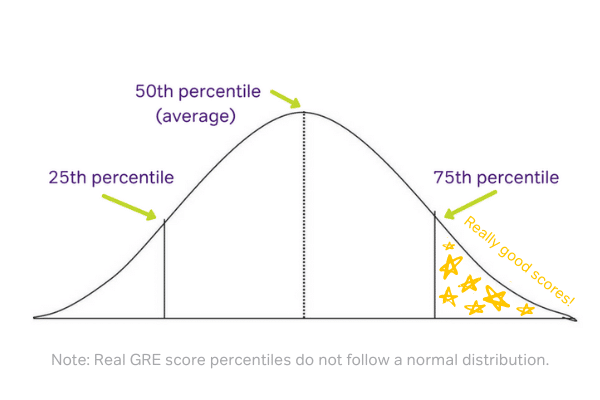What is a good GRE score? For most programs, it’s 75th percentile or above: 157+ in Verbal Reasoning and 165+ in Quantitative Reasoning. For top programs, it’s a 90th percentile score or higher: 162+ in Verbal and 169+ in Quant. However, finding the score you need for a particular program within the GRE scores range is slightly more complicated than that!
In this post, I’ll look at the factors that go into a good GRE score, from the score range to the average score per section. With this information under your belt, you’ll be better able to set the GRE goals that make sense for you—and make the most of your studies!
GRE Score Range: What are the GRE scores?
GRE scores range from 130 to 170 in the multiple-choice sections, in one-point increments. The GRE max score is 340 (the GRE total score ranges from 260-340). The essay/analytical writing score (AWA) runs from 0.0-6.0 in half-point increments. The GRE exam score range for different graduate schools, and even different programs at the same school, varies widely. All in all, several factors will affect what good scores are for you.
Table of Contents
What are the GRE scores ranges (Quant, Verbal, Combined)?
The GRE score range total runs from 260 to 340. Perfect GRE scores are 170 in each section, 340 combined. The table below shows the Verbal, Quantitative, and combined scores:
| Score Range | Perfect Scores | Competitive Scores | Average Scores | Below Average Scores | |
|---|---|---|---|---|---|
| Verbal | 130-170 | 170 | 157+ | 151 | 146 |
| Quantitative | 130-170 | 170 | 164+ | 155 | 148 |
| Combined Multiple Choice Scores | 260-340 | 340 | NA | NA | NA |
| AWA | 0.0-6.0 | 6.0 | 4.5+ | 3.5 | 3.0 |
GRE In-Section Scores
In-section scores are basically your score for the Verbal section and your score for the Quant section. It can definitely be confusing to contextualize your scores, especially because comparing Verbal scores to Quant scores can feel like comparing apples to oranges. Even the raw score to scaled score conversions are different!
Keep in mind that, depending on your program, your scores in one section may be weighted much more strongly in admissions. Of course, scoring high in both sections is a definite plus! We’ll cover more about in-section scores by program later.
Understanding GRE Percentiles
Score percentiles describe the percentage of test-takers who scored lower than you. If you scored in the 75th percentile, for example, that means that you scored better than 75 out of every 100 GRE test-takers. In terms of percentile ranks, most people would consider scoring within the top 10% of all test-takers pretty good!
In short, finding out GRE scoring percentiles for your target programs can help you set your goals. Find out more about GRE percentiles here.
What is the average GRE score in 2023-24?
Rounded to the nearest point, the average Verbal Reasoning score is 151, and the average Quant score is around 155. The AWA (analytical writing section) average is 3.6.
| Average Score | Percentile | |
|---|---|---|
| Verbal | 150.94 | 50th (152) |
| Quantitative | 155.44 | 49th (156) – 52nd (157) |
| AWA | 3.56 | 38th (3.5) – 56th (4.0) |
A lot of students aim for the skies and think of their goals in terms of a perfect score—a 170. But the reality is that many of us don’t need to attain such a lofty score. If you’re still wondering how to evaluate your scores in terms of the general pool of test-takers, looking at average scores can help. How? By providing a bigger picture of everyone taking the test and showing you where that middle point is.
What is the GRE score range by program?
A good score on the GRE varies significantly by program. Very generally, life sciences, mathematics, and physical sciences programs tend to value Quant scores more. For top business schools that accept the GRE, scores range between 161 and 168 for Quant, and 156 to 167 for Verbal.
However, the humanities and arts programs tend to value high Verbal scores more. Applicants admitted to the top 10 English programs had an average GRE Quant score of 157, in the 61st percentile on the GRE. That’s quite a difference!
Improve your GRE scores with Magoosh GRE, with over 1600+ practice questions including hundreds directly from the official makers of the GRE exam.
More Average GRE Test Scores by Intended Graduate Major Field
As you’re applying to graduate programs, the average score of all test-takers is irrelevant. For you, the average score for your particular program at your target school is much more important. This is the score you need to exceed.
The table below provides a helpful baseline, but note that these are average scores for all schools. To find the competitive scores you need, I highly recommend doing research for the specific colleges and universities that you are targeting.
| Intended Graduate Major Field | Average Verbal Score | Average Quant Score | Average AWA |
|---|---|---|---|
| Business | 152 | 158 | 3.7 |
| Education | 151 | 148 | 3.8 |
| Engineering | 151 | 160 | 3.5 |
| Humanities and Arts | 157 | 151 | 4.1 |
| Law | 155 | 153 | 4.2 |
| Life Sciences | 151 | 150 | 3.8 |
| Physical Sciences | 152 | 161 | 3.5 |
| Social and Behavioral Sciences | 154 | 153 | 4.0 |
Data from ETS Worldwide Test Taker Snapshot – 2023-24 (PDF)
What is a good GRE score for grad school?
Of course, which school you’re applying to will also have a lot to do with your target score. Programs may be more competitive at certain schools. First step? Look up the stats for the programs you’ll be applying to in our post on GRE Scores for Top Universities. Then, talk to current students and the admissions committee.
You can also go to schools’ websites and find a contact to email. Let them know you are a prospective student and provide some background about yourself; they may be able to connect you to a current student who has a similar background to you. They can give you a better idea of the types of students that the program is looking for (GRE scores, educational background, work experience, future goals, etc.).
What’s a good GRE score for me?
I can’t say it enough: “good” scores depend on your particular target school and program. But if you’re going to push me for an answer…
In very general terms, above the 75th percentile in either section is good. That’s about a 164 or higher in Quant and a 157 or higher in Verbal. To get about 160+ on each section, you can miss a little over half a dozen questions in Verbal and about 4-6 in Quant (which is curved a little harder). So there is a little room for error.
Why is the 75th percentile and up important? Click here to learn more
There are two main reasons to aim for above the 75th percentile:
- First, you want to give yourself some wiggle room in case you can’t quite reach your goal score. If you fall a bit short, then you can decide whether or not it’s worth retaking the GRE. Admitted students with below-average scores usually have an incredible application to make up for this deficit – impressive work/research experience, a compelling story, a strong college GPA, etc. Always consider your application as a whole when determining whether your GRE score is good enough.
- Second, you want to improve your odds of acceptance by impressing the admissions committee with a higher-than-expected score. If the average Math score for your program is 153, and you score a 158, then you automatically have a leg up on the competition. Admissions committees like to see that students can excel at standardized tests, in addition to having excellent, well-rounded applications.

These scores are at least one standard deviation from the mean. And scores two standard deviations from the mean put you near the top 5%, 170 in Quant and 165 in Verbal, at which point your score will certainly not be an impediment.
What’s a bad GRE score?
A bad GRE score is one that excludes you from the program that you want to attend. That’s all! But, for more context, the bottom 10% of test-takers score below 140 in Verbal and 142 in Quant. Again—very generally!—a good goal is to score better than average on the GRE.
What should I do if I don’t have a good score?
No matter what the case, don’t despair! If you have taken the test and were, say, a 145 scorer in both sections (that works out to the 22nd percentile in Verbal and the 15th percentile in Quant), then your road to improvement is pretty steep, but very doable.
By prepping hard for a month or two, you should be able to jump from the lowly teens and 20s to the respectable 44th and 35th percentiles, respectively: a mere five points, but you never know! This small number of questions could be the difference between getting into a program and not getting into a program.
How do I increase my scores?
With all of those factors in mind, it’s time to set your target score (or rather, target scores—one for each section).
Why? The GRE general test is a tough exam (in terms of both content and psychology) that’s meant to separate strong applicants from the rest of the pack. Succeeding on the GRE is a matter of determining what score you need well before your test date in order to make sure that your application is noticed and considered by your target programs.
Once you know your goal score, you can use a GRE practice test to help you determine how far you are from your target score and the type of GRE prep course that can help you get there. Then, to help you get there, check out Mason’s advice in Magoosh’s livestream for how to get a top score on the GRE!
Beyond grades and test scores, though, there are a few things that grad schools look for in applicants that can change how they see your application. Primary among these is your interest in—and demonstrated passion for—the field and your subject. Close behind these are how good a match you are for that particular program in terms of your goals and history and how they align with the program of study offered. Emphasizing these elements can go a long way towards getting you into the program of your dreams!






Leave a Reply